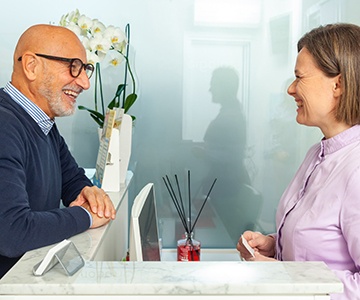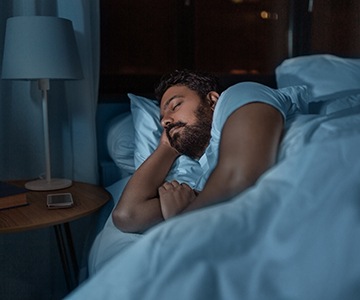How We Treat Sleep Apnea with Oral Appliance Therapy in The Woodlands
If you are suffering from obstructive sleep apnea, then our practice can help provide relief using a safe, comfortable, and effective treatment: oral appliance therapy. Dr. Robert Dernick has used this method with great success, and he can do the same for you. If you believe that you have sleep apnea, have a sleep apnea diagnosis and still need treatment, or if you’d like to get rid of your CPAP, oral appliance therapy may be exactly what you’ve been looking for.
What is Oral Appliance Therapy?

Oral appliance therapy is a treatment methodology that utilizes a custom-made mouthpiece worn during the night to prevent the symptoms of sleep apnea, specifically, the lapses in breathing that occur during sleep. It accomplishes this by gently shifting the jaw forward in order to keep the airway open throughout the night. At our practice, Dr. Dernick coordinates with a team of local sleep experts to ensure that every oral appliance fits comfortably and enables a patient to get the quality sleep that they need.
Is Oral Appliance Therapy Right For Me?

We can use oral appliance therapy to help people who:
- Have been diagnosed with mild to moderate obstructive sleep apnea, in many cases even severe OSA
- Want to try an alternative treatment option to a CPAP machine
- Are CPAP intolerant
- Have undergone corrective surgery but still have little to no relief from their sleep apnea
- Need a more portable sleep apnea treatment
- Could benefit from combined therapy
How Oral Appliance Therapy Can Help CPAP Patients

According to research, as many as 50% of the people who are prescribed to use a CPAP machine don’t, and if you have one, then it’s probably no mystery why. The machine can be loud, bulky, inconvenient, and many patients feel very constricted while wearing the mask.
Oral appliance therapy offers a viable treatment option that instantly takes care of all of these problems. These appliances make no sound, they are custom-made to fit every patient, and they can easily travel everywhere you do. Many patients are able to achieve instant relief from their sleep apnea and enjoy increased comfort thanks to oral appliance therapy. It can even be used in conjunction with a CPAP machine for combined therapy. However, it does not work for all patients, so you will need to consult with your sleep doctor and Dr. Dernick before trying this option.
What to Expect After Getting an Oral Appliance

A patient will go through a bit of an adjustment period after being fitted for an oral appliance. The effects listed below are typically very minor and should abate after about a week of consistent use:
- Jaw tension, clicking, or popping while it adjusts to the new resting position
- Slight soreness in the teeth or gums
- More or less saliva being produced in the mouth
- A change in the feeling of the bite
A Word From the AASM and the AADSM

The American Academy of Sleep Medicine (AASM) and the American Academy of Dental Sleep Medicine (AADSM) are two professional organizations that set the standards for the prevention, diagnosis, and treatment of sleep apnea in the United States. Through them, a doctor like Dr. Dernick can receive up-to-date research, certifications, and continuing education.
As leading authorities on sleep apnea, they advise patients to consider the following when it comes to oral appliance therapy and sleep apnea treatment in general:
- Patients who chronically snore should consult with a sleep dentist to make sure it isn’t a symptom of sleep apnea. While not all snorers necessarily have sleep apnea, it could be a sign that a person isn’t getting the most restful sleep that they can. Snoring can be easily addressed using a custom-made oral appliance provided by a licensed practitioner (like Dr. Dernick).
- While there are numerous generic oral appliances that can be purchased at the store or online, they should largely be avoided. These are typically made to fit a wide range of people and cannot provide the same results as a custom-made appliance. In many cases, they can cause jaw pain and even make a person’s sleep apnea symptoms worse. It is best to only get an oral appliance through a qualified sleep dentist.
- If a patient is CPAP intolerant, CPAP non-compliant, or otherwise unable/unwilling to consistently use their CPAP, they should consult their sleep doctor to see if oral appliance therapy could provide a viable treatment alternative. They can then partner with Dr. Dernick in order for you to receive an appliance (at their recommendation).
- After being fitted for an oral appliance, a patient will need to complete an additional sleep study in order to make sure the device is actually helping to reduce sleep apnea symptoms. They may also need to visit their sleep dentist periodically to make sure their oral appliance is in good working condition.
If you would like to learn more about oral appliance therapy and how it could help you, please contact Dr. Dernick for a consultation today. He’ll be ready to answer all of your questions and ensure you receive the treatment you need.
Understanding the Cost of Sleep Apnea Treatment

Whenever you get diagnosed with a medical condition, usually the first question that comes to mind is, “How much will treatment cost?” The cost of sleep apnea treatment in The Woodlands will largely depend on what type of solution you opt to use and whether your medical insurance benefits will cover it. Fortunately, our team at Robert G. Dernick, DDS will help you navigate these important details and any concerns you may have beforehand to make sure you don’t receive any surprise bills down the road.
Does Dental Insurance Cover the Cost of Sleep Apnea Treatment?

In most cases, dental insurance plans don’t cover the cost of sleep apnea treatment, even though your treatment may be prescribed by a dentist. This is why our practice also accepts medical insurance! We’re happy to file claims on your behalf to make sure as much of your treatment cost is covered by your benefits as possible. Our knowledgeable team can even submit a benefits check before you decide to move forward with care so we can provide you with a cost estimate that factors in your medical insurance coverage.
Factors That Affect the Cost of Sleep Apnea Treatment

There are a few different details that will impact the cost of your sleep apnea treatment, including:
- Whether your medical insurance plan covers the different parts of your care.
- Whether you’ve already received a sleep study, which is how you’re able to get diagnosed with sleep apnea.
- What treatment choice you opt for, whether that’s CPAP therapy, OAT, or a combination of both.
Treat Your Sleep Apnea Now to Boost Your Future Overall Health

Did you know that obstructive sleep apnea has been linked to an increased risk of several health complications, including heart attacks, strokes, and Alzheimer’s? Our team is committed to helping our patients make the best decisions for their overall health and wellbeing, which is why we always advise you to seriously consider sleep apnea treatment. If you’ve been diagnosed with obstructive sleep apnea, receiving oral appliance treatment or using a CPAP machine can help boost your overall health, providing you with a brighter, healthier future.
Options for Making Sleep Apnea Treatment More Affordable

In addition to filing claims through medical insurance plans, our team offers flexible financing through CareCredit. If you’re not able to pay for the entire cost of treatment up-front, CareCredit allows you to split the cost up into smaller, easier to manage monthly payments with little-to-no interest. All you have to do to learn whether you qualify is apply!
 Sleep Apnea &
Sleep Apnea &